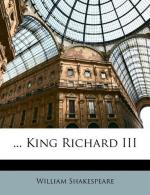|
This section contains 4,587 words (approx. 16 pages at 300 words per page) |

|
SOURCE: “Richard III and the Reformation,” in Journal of English and Germanic Philology, Vol. 83, No. 4, October, 1984, pp. 509-21.
In the following essay, Richmond analyzes the “massive” religious vocabulary of Richard III and reveals the ways in which the play explores contemporary religious tensions between Protestants and humanists.
When Richard of Gloucester compares himself to “the formal Vice, Iniquity” (III.1.82)1 and is repeatedly called “a Devil,” the play of Richard III explicitly recalls the archaic formulas of the miracle plays, mystery cycles, and the morality plays, which were dying out in Shakespeare's lifetime under the combined hostilities of the Reformers and the Humanists. Shakespeare, however, had excellent historical justification for putting such specific allusions to the religious drama into Richard's mouth. Ample evidence survives from the fifteenth century of the intense interest in drama in Northern England, which was Richard's primary power base—and particularly in the city of...
|
This section contains 4,587 words (approx. 16 pages at 300 words per page) |

|


